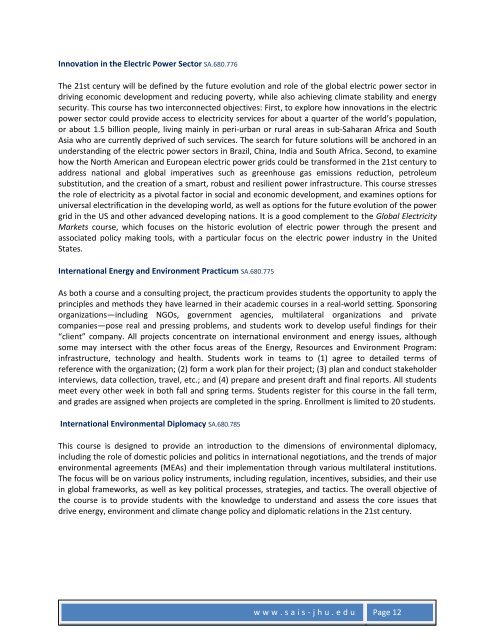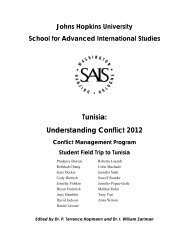energy, resources and environment program - Johns Hopkins ...
energy, resources and environment program - Johns Hopkins ...
energy, resources and environment program - Johns Hopkins ...
Create successful ePaper yourself
Turn your PDF publications into a flip-book with our unique Google optimized e-Paper software.
Innovation in the Electric Power Sector SA.680.776<br />
The 21st century will be defined by the future evolution <strong>and</strong> role of the global electric power sector in<br />
driving economic development <strong>and</strong> reducing poverty, while also achieving climate stability <strong>and</strong> <strong>energy</strong><br />
security. This course has two interconnected objectives: First, to explore how innovations in the electric<br />
power sector could provide access to electricity services for about a quarter of the world’s population,<br />
or about 1.5 billion people, living mainly in peri-urban or rural areas in sub-Saharan Africa <strong>and</strong> South<br />
Asia who are currently deprived of such services. The search for future solutions will be anchored in an<br />
underst<strong>and</strong>ing of the electric power sectors in Brazil, China, India <strong>and</strong> South Africa. Second, to examine<br />
how the North American <strong>and</strong> European electric power grids could be transformed in the 21st century to<br />
address national <strong>and</strong> global imperatives such as greenhouse gas emissions reduction, petroleum<br />
substitution, <strong>and</strong> the creation of a smart, robust <strong>and</strong> resilient power infrastructure. This course stresses<br />
the role of electricity as a pivotal factor in social <strong>and</strong> economic development, <strong>and</strong> examines options for<br />
universal electrification in the developing world, as well as options for the future evolution of the power<br />
grid in the US <strong>and</strong> other advanced developing nations. It is a good complement to the Global Electricity<br />
Markets course, which focuses on the historic evolution of electric power through the present <strong>and</strong><br />
associated policy making tools, with a particular focus on the electric power industry in the United<br />
States.<br />
International Energy <strong>and</strong> Environment Practicum SA.680.775<br />
As both a course <strong>and</strong> a consulting project, the practicum provides students the opportunity to apply the<br />
principles <strong>and</strong> methods they have learned in their academic courses in a real-world setting. Sponsoring<br />
organizations—including NGOs, government agencies, multilateral organizations <strong>and</strong> private<br />
companies—pose real <strong>and</strong> pressing problems, <strong>and</strong> students work to develop useful findings for their<br />
“client” company. All projects concentrate on international <strong>environment</strong> <strong>and</strong> <strong>energy</strong> issues, although<br />
some may intersect with the other focus areas of the Energy, Resources <strong>and</strong> Environment Program:<br />
infrastructure, technology <strong>and</strong> health. Students work in teams to (1) agree to detailed terms of<br />
reference with the organization; (2) form a work plan for their project; (3) plan <strong>and</strong> conduct stakeholder<br />
interviews, data collection, travel, etc.; <strong>and</strong> (4) prepare <strong>and</strong> present draft <strong>and</strong> final reports. All students<br />
meet every other week in both fall <strong>and</strong> spring terms. Students register for this course in the fall term,<br />
<strong>and</strong> grades are assigned when projects are completed in the spring. Enrollment is limited to 20 students.<br />
International Environmental Diplomacy SA.680.785<br />
This course is designed to provide an introduction to the dimensions of <strong>environment</strong>al diplomacy,<br />
including the role of domestic policies <strong>and</strong> politics in international negotiations, <strong>and</strong> the trends of major<br />
<strong>environment</strong>al agreements (MEAs) <strong>and</strong> their implementation through various multilateral institutions.<br />
The focus will be on various policy instruments, including regulation, incentives, subsidies, <strong>and</strong> their use<br />
in global frameworks, as well as key political processes, strategies, <strong>and</strong> tactics. The overall objective of<br />
the course is to provide students with the knowledge to underst<strong>and</strong> <strong>and</strong> assess the core issues that<br />
drive <strong>energy</strong>, <strong>environment</strong> <strong>and</strong> climate change policy <strong>and</strong> diplomatic relations in the 21st century.<br />
w w w . s a i s - j h u . e d u Page 12
















